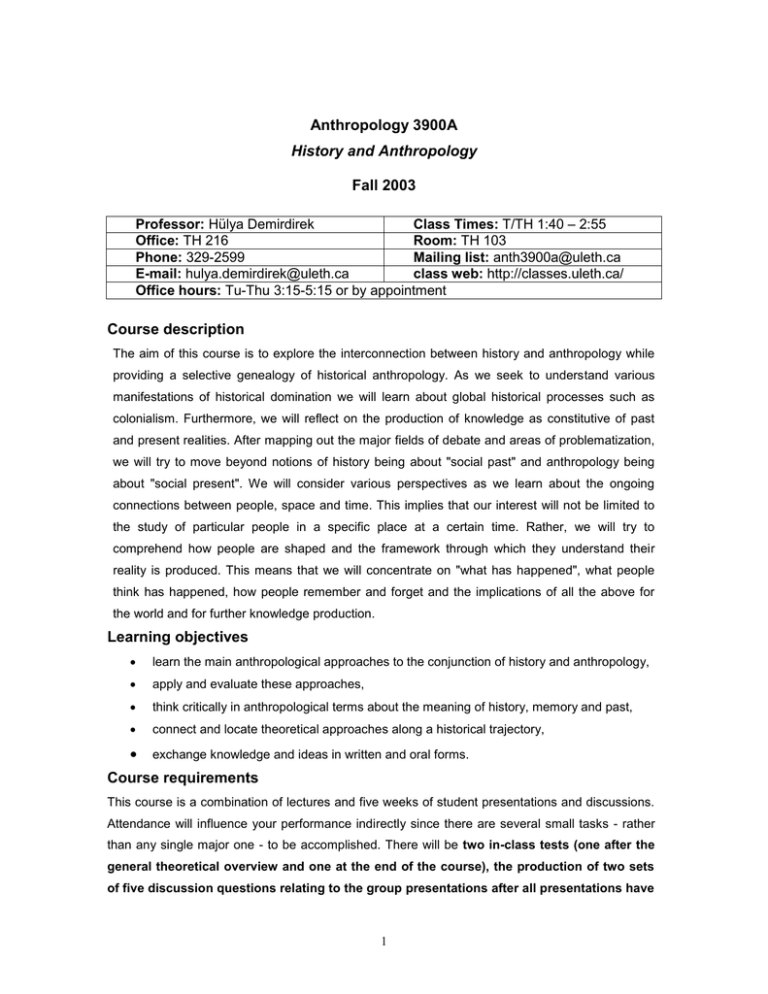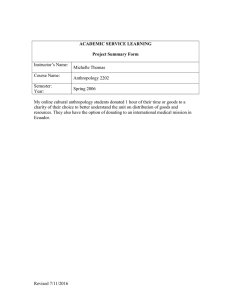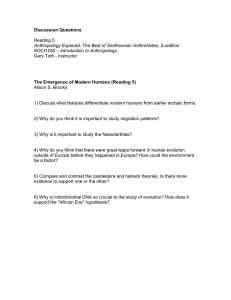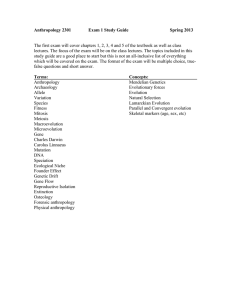Anthropology 3900A Fall 2003 Course description
advertisement

Anthropology 3900A History and Anthropology Fall 2003 Professor: Hülya Demirdirek Class Times: T/TH 1:40 – 2:55 Office: TH 216 Room: TH 103 Phone: 329-2599 Mailing list: anth3900a@uleth.ca E-mail: hulya.demirdirek@uleth.ca class web: http://classes.uleth.ca/ Office hours: Tu-Thu 3:15-5:15 or by appointment Course description The aim of this course is to explore the interconnection between history and anthropology while providing a selective genealogy of historical anthropology. As we seek to understand various manifestations of historical domination we will learn about global historical processes such as colonialism. Furthermore, we will reflect on the production of knowledge as constitutive of past and present realities. After mapping out the major fields of debate and areas of problematization, we will try to move beyond notions of history being about "social past" and anthropology being about "social present". We will consider various perspectives as we learn about the ongoing connections between people, space and time. This implies that our interest will not be limited to the study of particular people in a specific place at a certain time. Rather, we will try to comprehend how people are shaped and the framework through which they understand their reality is produced. This means that we will concentrate on "what has happened", what people think has happened, how people remember and forget and the implications of all the above for the world and for further knowledge production. Learning objectives learn the main anthropological approaches to the conjunction of history and anthropology, apply and evaluate these approaches, think critically in anthropological terms about the meaning of history, memory and past, connect and locate theoretical approaches along a historical trajectory, exchange knowledge and ideas in written and oral forms. Course requirements This course is a combination of lectures and five weeks of student presentations and discussions. Attendance will influence your performance indirectly since there are several small tasks - rather than any single major one - to be accomplished. There will be two in-class tests (one after the general theoretical overview and one at the end of the course), the production of two sets of five discussion questions relating to the group presentations after all presentations have 1 been completed, group work and a paper. The group work and paper are all related and contribute to one another. The details of each task are explained below. Grading A+ = 100 - 95 % A = 94 - 90 % A- = 89 - 85 % B+ = 84 - 80 % B = 79 - 75 % B- = 74 - 70 % Weighting: C+ = 69 - 65 % C = 64 - 60 % C- = 59 - 55 % D + = 54 - 53 % D = 52 - 50 % F: 49 % and below Marking: Tests (2 x 20 % each) 2 tests, each 20 points (Total 40 points) Paper (35 %) Paper 100 points (Total 100 points) Group work (15 %) Group presentation 15 points Question production (10 %) Question production 10 points Evaluation will be based on Two in-class tests (each 20%) Tests will be comprised of short answer questions. The questions will test your knowledge of the main points of the readings and are intended to help you formulate your knowledge on the basis of the readings/discussions. Group presentation and discussion (15%): The preparation period will help you to accomplish your own individual assignments and at the same time contribute to the group work. There will be five groups, the size of which will depend on the size of the class. This task will involve intensive library research. All the members of a group will read one of the five books in its entirety and find reviews, other books or articles which refer to that book extensively as well as books and articles which are produced about the same topic. The aim is to learn about the case study/examine the way in which history or historical analysis is utilized by the author/s, examine the way in which the author(s) present(s) and analyze(s) the case, place the author(s) within the theoretical map of schools of thought and examine the debate the book has created. An oral presentation will then be made to the rest of the class. You need to make a division of labour: all members of the group must work on the presentation of an aspect or section of the book; clearly, however, responsibility for the final oral presentation of each aspect/section must be assigned to one person. Although there are of course several aspects/sections to cover, it is possible that not all members of each group will have the opportunity to take on the presenter's role owing to the number of persons in the group. The task of the presenter is to introduce the key arguments and lead the discussion. Those of the students who form the audience for each presentation are encouraged to find and read in advance one 2 book review only of the book in question. It is not mandatory for them to read the book. The audience will be encouraged to challenge the presentation group in a constructive manner, both in terms of what they covered and how they presented their arguments. This group work does not require a great deal of work outside of the class time. We will allocate one discussion room to each group on WebCT. In this way you will not need to struggle to organize meetings. Marking will be on the basis of the collective outcome. Under normal circumstances all group members will get the same grade. Please keep in mind that group work facilitates learning and, furthermore, most of the world outside of university life involves some form of group cooperation. Individual paper based on group work (35%): Inspired by your group work and by utilizing the materials you collected for it, you should choose a topic. This has to be approved by the instructor. You can choose a particular theoretical problem and discuss it by making a comparison with other approaches and case studies; alternatively, you can examine the ethnography presented by the author from a different perspective. Topic approval deadline is September 30. Question production (10%): After each of the case study presentation weeks you should prepare two discussion questions on each case study (including your own). This means producing a total of ten questions for five studies. You will then submit these questions in a one batch at the end of the presentation phase (13 November). Required texts The books for presentation can be either borrowed from me or borrowed from the library. There is no course package in this course. Your effort to access the reading material is part of the learning process. Since many of the articles in our reading list are available through the online data bases you will be able to save money by finding and downloading the articles yourself and at the same time the library work will reinforce your scholarly engagement. Other texts are available on reserve in the library. Schedule and deadlines: Test 1 October 7 Paper topic approval September 30 Submission of questions November 13 Submission of paper November 27 Test 2 December 4 3 Please note: 1. Papers and questions are to be submitted at the start of the class on the due day. 2. If you are unable to attend the class that day please make sure that you submit your assignment either through a classmate or to the anthropology secretary. She has to confirm your submission by noting the time and date on your assignment. 3. Papers/Questions which are pushed UNDER MY DOOR will NOT be ADMITTED unless you speak to me in advance. 4. Uncollected exams or assignments can be picked up from the anthropology office. 5. Exams are not cumulative and each will cover only material presented since the last test. 6. Academic dishonesty is considered a very serious offense (See pp.63-66 of the U of L Calender.) U of L subscribes to a plagiarism software called Turnitin.com. Your assignments may be reviewed using it to detect cyber-plagiarism. 7. If you have any MEDICAL CONDITION which influences your learning please contact me. Schedule of Lectures, Presentations and Readings Week 1 September 4 Overview of the course and introduction Week 2 September 9 History and anthropology Reading: Cohn History and anthropology: The state of play September 11 Forming of groups and group work Week 3 September 16 History and anthropology Reading: Cohn An anthropologist among historians September 18 Structure and history Reading: Lévi-Strauss, 1. Structural Anthropology 2. History and dialectic Week 4 September 23 History and political economy Reading: Roseberry, Introduction September 25 History and political economy Reading: Roseberry, 1. Balinese Cockfights and the Seduction of Anthropology 2. Marxism and culture Week 5 September 30 ** Deadline for topic approval** Reading: Wolf, History and the other Introduction October 2 History and social sciences Reading: Braudel Time, history and the social sciences 4 Week 6 October 7 TEST 1 October 9 Colonial encounters Reading: Comaroff and Comaroff, Ethnography and the historical imagination Week 7 October 14 Presentation: Comaroff and Comaroff, Body of Power Spirit of Resistance October 16 Presentation: Bloch, From Blessing to Violence Week 6 October 21 Discussion: Bloch and Comaroffs Reading: Connerton, Bodily practices" and "Commemorative ceremonies (How societies remember) October 23 Presentation: Tonkin, Narrating Our Pasts Week 6 October 28 Presentation: Mintz, Sweetness and Power October 30 Discussion: Mintz and Tonkin Reading: Troulliot, The power of the story Week 7 November 4 Presentation: Strathern, After Nature November 6 Discussion: After Nature Reading: Harris, Knowing the past: The Antinomies of loss…. Week 11 November 11 University Closed November 13 **Submission of questions** Myth in Time Reading: Sahlins, Other Times, Other Customs: The Anthropology of History Week 8 November 18 Construction of the past Reading: Freedman, Myth, History and Political Identity November 20 Film: TBA Week 9 November 25 History and identities November 27 **Submission of paper** Time and the other Reading: Prakash, Writing Post-Orientalist Histories …. Reading: Fabian Our time, Their Time, No time: Coevalness Denied 5 Week 10 December 2 Review December 4 (Final Class) TEST 2 Happy holidays and Happy New Year! Lists of books for presentations and articles: L= the journal/book is available in the library, Rc = a copy of the article/chapter is on reserve, Rb = the book is on reserve, JSTOR = available online through JSTOR, HD = You have to barrow it from HD. Books (Rb/HD) Bloch, Maurice 1986 From blessing to violence : history and ideology in the circumcision ritual of the Merina of Madagascar, Cambridge [Cambridgeshire] : Cambridge University Press. (Rb/HD) Comaroff, Jean 1985 Body of power, spirit of resistance : the culture and history of a South African people, Chicago : University of Chicago Press. (HD) Mintz, Sidney W. 1985 Sweetness and Power, The place of Sugar in Modern History, New York: Penguin Books. (Rb/HD) Strathern, Marilyn 1992 After nature : English kinship in the late twentieth century, Cambridge ; New York : Cambridge University Press. (Rb/HD) Tonkin, Elizabeth 1995 (1992) Narrating our pasts : the social construction of oral history, New York : Cambridge University Press. Articles/Chapters 1. (Rc) Braudel, Fernand 1956 "Time, history and the social sciences" in (ed.) Fritz Stern, The Varieties of History, New York: Vintage Books. pp. 403- 429. 2. (Rc, Rb) Cohn, Bernard S. 1980 "An anthropologist among the historians: A field Study" in An anthropologist among the historians and other essays, New Delhi ; Toronto : Oxford University Press. pp. 1-17. 3. (Rb, Rc, JSTOR) Cohn, Bernard S. 1980 "History and Anthropology: The State of Play", in An anthropologist among the historians and other essays, New Delhi ; Toronto : Oxford University Press. pp. 18-49. 6 (JSTOR) History and Anthropology: The State of Play (in Approaches to Historical Comparison) Bernard S. Cohn, Comparative Studies in Society and History, Vol. 22, No. 2. (Apr., 1980), pp. 198221. 4. (L, Rc) Comaroff, John L. and Jean Comaroff 1992 "Ethnography and Historical Imagination" in Ethnography and the historical imagination, Boulder : Westview Press. pp. 3-48. 5. (Rb) Connerton, Paul 1989 "Bodily practices" and "Commemorative ceremonies", How societies remember. Cambridge: CUP. pp. 41-104. 6. (Rc, Rb) Fabian, Johannes 1983 "Our time, Their Time, No time: Coevalness Denied" in Johannes Fabian, Time and the other: How anthropology makes its object. New York: Columbia University Press. pp. 37-104. 7. (Rc) Harris, Olivia 1995 "Knowing the past: The antinomies of loss in Highland Bolivia", in R. Fardon (ed.) Counterworks, London and NewYork : Routledge. pp. 105-123 8. (L, JSTOR) Friedman, Jonathan 1992 " Myth, History, and Political Identity, Cultural Anthropology, Vol. 7, No. 2. (May, 1992), pp. 194-210. 9. (Rc, Rb) Lévi-Strauss, Claude 1963 "Introduction: History and Anthropology" in Lévi- Claude Strauss, Structural Anthropology, New York: Basic Books. pp. 1-27. 10. (Rc, Rb) Lévi-Strauss, Claude 1968 (1962) "History and dialectic" in Lévi- Claude Strauss, The Savage Mind, Chicago: University of Chicago Press. pp. 245-269. 11. (L, JSTOR) Prakash, Gyan 1990 Writing Post-Orientalist Histories of the Third World: Perspectives from Indian Historiography (in CSSH Discussion) Comparative Studies in Society and History, Vol. 32, No. 2. (Apr., 1990), pp. 383-408. 12. (Rc, Rb) Roseberry, William, 1989 "Introduction", "Balinese Cockfights and the Seduction of Anthropology", "Marxism and culture" in, William Roseberry, Anthropologies and histories : essays in culture, history, and political economy, New Brunswick : Rutgers University Press. pp. 1-54. 13. (L, JSTOR) Sahlins, Marshall 1985 " Other Times, Other Customs: The Anthropology of History" in Islands of History, Chicago: The University of Chicago Press. (JSTOR) "Other Times, Other Customs: The Anthropology of History" 7 American Anthropologist, New Series, Vol. 85, No. 3. (Sep., 1983), pp. 517-544. 14. (Rc) Trouillot, Michel-Rolph 1995 "The Power in the Story", in Michel-Rolph Trouillot Silencing the Past. Power and the Production of History, Boston: Beacon Press. 15. (Rb, Rc) Wolf, Eric Robert, 1982 "Introduction" in Europe and the people without history, Berkeley : University of California Press. pp. 3-23. 8





